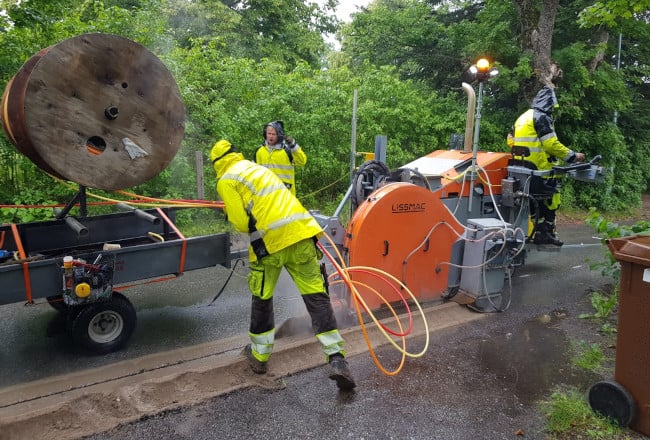Openreach Hits Halfway Mark In Quest To Hook Up 25M Premises With Fiber Broadband

Openreach claims it has reached the halfway point in its goal of rolling out fiber broadband to 25 million UK premises by the end of 2026.
Openreach, the infrastructure arm of BT, said it has made fiber access available to 12.5 million homes, businesses, and public services across the country as it continues the program to boost uptake of fiber-to-the-premises (FTTP) or "full-fiber" internet connections.
That figure should be taken with pinch of salt, of course, as it means that the company has now deployed fiber infrastructure into areas that make up a total of 12.5 million premises. Customers are not actually connected until they sign up for a fiber contract with an internet service provider (ISP) that uses Openreach's infrastructure – such as BT, Sky or TalkTalk – and the company informed us that this figure currently stands at just over 4 million.
Openreach has now added another 142 locations to its build program, which it said covers a further 1.4 million homes and businesses, including many in rural areas. The list includes areas in Greater London, Yorkshire, Hampshire, Lanarkshire, and all over the country, but the company provides an interactive map on its website where anyone can enter their postcode to check the status of their area.
The list of locations includes 25 in Scotland like Bannockburn in Stirling, Lochgelly in Fife, and Clydebank in West Dunbartonshire.
Earlier, Openreach said it has completed a four-year project of rolling out fiber in Wales, with the infrastructure capable of reaching more than 44,000 homes and businesses across the country.
Chief executive Clive Selley, said: "Our build rate is still accelerating and it'll take us half the time to reach our next 12.5 million. But we won't be stopping there. Ultimately, we'll reach up to 30 million premises by the end of the decade," Selley said in a statement.
This will help unlock a raft of economic and social benefits by supporting new models of commerce, healthcare, and public services, he added.
Telecoms analyst Paolo Pescatore of PP Foresight said this news is a significant milestone and one that should be applauded, but more work required to connect harder-to-reach areas.
"Arguably, the toughest job still lies ahead and more needs to be done to ensure all of the UK can be connected with fiber broadband," he told us.
- UK to crack down on imported Chinese optical fiber cables
- Progress towards 'Gigabit Europe' is slow, with UK also lagging
- BT dips toe into liquid cooling in quest for a chill network
- BT hires chartered management accountant and telco veteran as next CEO
"It does underline the importance of collaboration and longer term certainty among its [BT's] customers in order to reach its targets. However, the entire industry should be working together to ensure there is no significant overbuild on the altnets."
This latter point about smaller alternative network providers, or "altnets," has been the subject of controversy this year because of Openreach's Equinox 2 scheme to encourage take-up of fiber broadband.
Under the scheme, Openreach offers ISPs discounts on wholesale pricing if they can get new subscribers to sign up for fiber-to-the-premises (FTTP) via its infrastructure.
Altnets such as Virgin Media and CityFibre had raised objections that this gave Openreach an unfair advantage because it incentivized ISPs to use its network instead of alternatives, but telecoms regulator Ofcom gave it the go-ahead earlier this year.
CCS Insight analyst Kester Mann welcomed the news that Openreach was at the halfway point, saying that the UK is now "full steam ahead on fiber deployment after a depressingly stuttering start."
He said this is an important milestone on the way to reaching Openreach's target, and one that outgoing BT chief Philip Jansen will take pride in, having made it a priority for the operator during his tenure.
Jansen announced in July he would be standing down as CEO of the telecoms giant within 12 months, having overseen a massive cost-cutting program and BT's share price falling by almost half on his watch.
Engineers and other staff might be glad to see the back of Jansen, who has put in motion major job cuts at BT which are expected to see between 40,000 and 55,000 employees made redundant by 2030. ®
From Chip War To Cloud War: The Next Frontier In Global Tech Competition
The global chip war, characterized by intense competition among nations and corporations for supremacy in semiconductor ... Read more
The High Stakes Of Tech Regulation: Security Risks And Market Dynamics
The influence of tech giants in the global economy continues to grow, raising crucial questions about how to balance sec... Read more
The Tyranny Of Instagram Interiors: Why It's Time To Break Free From Algorithm-Driven Aesthetics
Instagram has become a dominant force in shaping interior design trends, offering a seemingly endless stream of inspirat... Read more
The Data Crunch In AI: Strategies For Sustainability
Exploring solutions to the imminent exhaustion of internet data for AI training.As the artificial intelligence (AI) indu... Read more
Google Abandons Four-Year Effort To Remove Cookies From Chrome Browser
After four years of dedicated effort, Google has decided to abandon its plan to remove third-party cookies from its Chro... Read more
LinkedIn Embraces AI And Gamification To Drive User Engagement And Revenue
In an effort to tackle slowing revenue growth and enhance user engagement, LinkedIn is turning to artificial intelligenc... Read more

